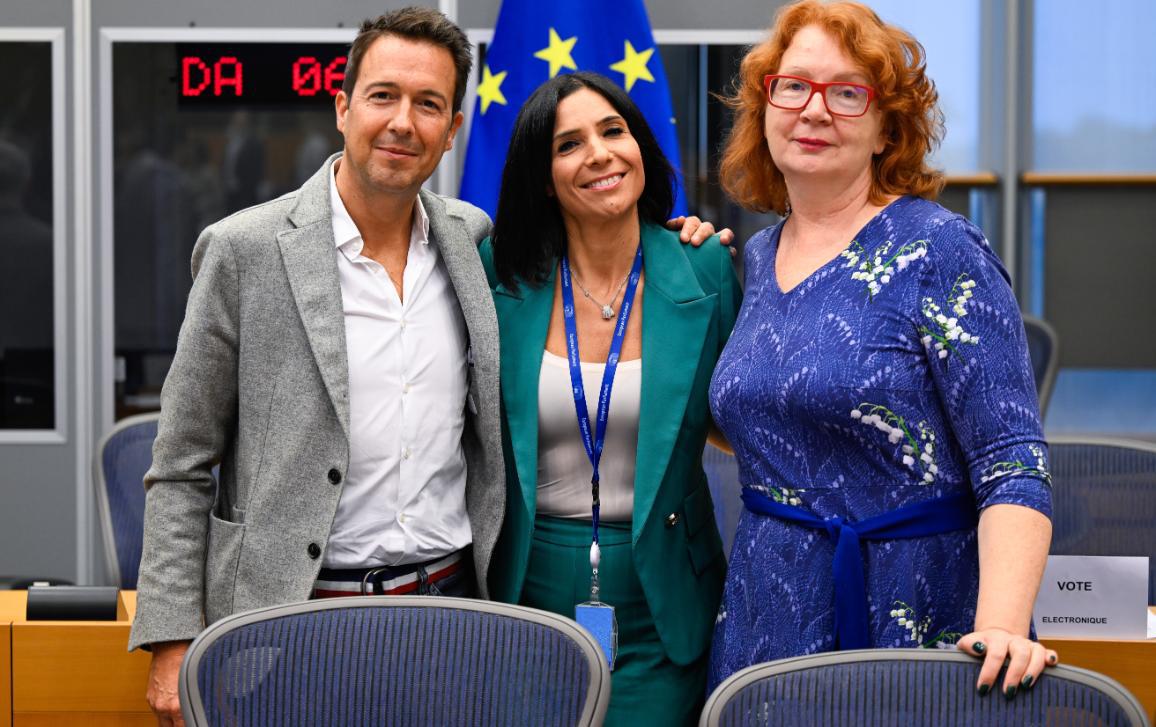ASTANA – This week, 11 members of the European Parliament Delegation for Relations with Central Asia and Mongolia, led by newly appointed chair Giusi Princi, will visit Astana and Almaty. The delegation, known as DCAS, will participate in the 21st meeting of the Kazakhstan-EU Parliamentary Cooperation Committee.

From left to right: Guillaume Peltier, Giusi Princi and Jana Toom. Photo credit: europarl.europa.eu
DCAS comprises 19 members of the European Parliament (MEP) from diverse political groups and countries, focusing on strengthening inter-parliamentary relations and addressing bilateral issues. In an interview with the Kazinform news agency, Princi and Guillaume Peltier, DCAS’s first vice president and French MEP, outlined the visit’s prospects and agenda.
“This will be the largest delegation ever organized in the region,” Princi said.
According to Princi, the visit sends a strong signal about the future of EU relations with Central Asia, particularly Kazakhstan.
She expressed gratitude for the cooperation from Kazakhstan’s embassy and the Parliament in preparing for the visit.
Kazakhstan-EU relations are grounded in the Enhanced Partnership and Cooperation Agreement, which came into force in 2020 and covers a wide range of sectors, including trade, human rights, energy, security and environmental protection.
“The EU is Kazakhstan’s largest trading partner, accounting for about a third of the country’s foreign trade, while the country plays a crucial role in Europe’s energy supply, exporting significant volumes of oil and natural gas,” said Princi.
She emphasized the importance of expanding these relations into new areas, such as renewable energy, raw materials and connectivity. The EU also values Kazakhstan’s ongoing efforts in democratic governance, human rights and domestic violence reform under President Kassym-Jomart Tokayev.
“The bridge we want to build is not only connected to trade or energy but also democracy and, above all, friendship. Friendship and mutual respect connect the peoples of Europe, especially Italy, with the Kazakh people,” she said.
Agenda and key meetings
During the delegation’s stay in Astana and Almaty, MEPs are set to meet with ministers, human rights advocates, civil society representatives and visit a Kazakh university. Key topics include strengthening political and economic cooperation.
Princi noted that the main discussions will focus on the outcomes of the recent Kazakhstan-EU Cooperation Council meeting. These discussions will revolve around implementing the Enhanced Partnership and Cooperation Agreement, advancing internal reforms and upholding the rule of law and human rights.
Other agenda items include the Trans-Caspian transport corridor, aimed at enhancing transport infrastructure between Europe and Asia and bolstering Kazakhstan’s status as a logistics hub.
The talks will address energy cooperation and climate action, emphasizing diversifying energy sources and developing hydrogen renewables and critical raw materials.
“Discussions will also cover promoting pluralism and press freedom in this key Central Asian country,” said Princi.
Migration and visa policies
Princi addressed migration issues, a pressing topic in the EU. She emphasized the need for a pragmatic approach that respects international law, including strengthening external border security and establishing partnerships with third countries to process asylum requests.
“Key proposals include a new Pact on Migration and Asylum, which recently received institutional approval, along with measures to strengthen external border security, vital for Schengen’s effective operation,” said Princi.
A new Mediterranean Pact, proposed by the European People’s Party, could include appointing a European commissioner to boost Europe’s global ambitions, recognizing the Mediterranean’s strategic role from Africa to the Middle East.
“It is critical to explore options for comprehensive partnerships with third countries to combat human trafficking, reduce illegal border crossings, assist asylum seekers and promote returns to countries of origin or safe countries. Moreover, the EU should use all political tools, including visa policy,” said Princi.
She also advocated for simplifying the visa process for Kazakh citizens visiting the EU. While this falls under the EU Council’s jurisdiction, Princi welcomed ongoing negotiations to reduce visa costs and processing times, which began in June 2024.
Future of EU-Central Asia relations
Reflecting on his recent appointment, Peltier stated, “I am convinced that building strong partnerships in Central Asia is essential amid the turbulence of our multipolar world. These countries serve as vital trade and economic interfaces, and their role will continue to grow.”
As a committee chair overseeing EU trade agreements with Central Asian countries, Peltier pledged to advocate for deepening trade relations with Kazakhstan, prioritizing partnerships that promote energy independence, respect borders, and enhance diplomatic and trade exchanges.
“Strengthening ties between France and Central Asia is a personal priority, as partnerships should bring societies closer together along with institutional engagement,” he added.
The article was originally published in Kazinform.
